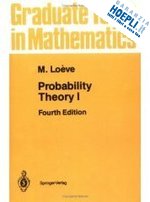of Volume I.- Introductory Part: Elementary Probability Theory.- I. Intuitive Background.- 1. Events.- 2. Random events and trials.- 3. Random variables.- II. Axioms; Independence and the Bernoulli Case.- 1. Axioms of the finite case.- 2. Simple random variables.- 3. Independence.- 4. Bernoulli case.- 5. Axioms for the countable case.- 6. Elementary random variables.- 7. Need for nonelementary random variables.- III. Dependence and Chains.- 1. Conditional probabilities.- 2. Asymptotically Bernoullian case.- 3. Recurrence.- 4. Chain dependence.- *5. Types of states and asymptotic behavior.- *6. Motion of the system.- *7. Stationary chains.- Complements and Details.- One: Notions of Measure Theory.- I: Sets, Spaces, and Measures.- 1. Sets, Classes, and Functions.- 1.1 Definitions and notations.- 1.2 Differences, unions, and intersections.- 1.3 Sequences and limits.- 1.4 Indicators of sets.- 1.5 Fields and ?-fields.- 1.6 Monotone classes.- *1.7 Product sets.- *1.8 Functions and inverse functions.- *1.9 Measurable spaces and functions.- *2. Topological Spaces.- *2.1 Topologies and limits.- *2.2 Limit points and compact spaces.- *2.3 Countability and metric spaces.- *2.4 Linearity and normed spaces.- 3. Additive Set Functions.- 3.1 Additivity and continuity.- 3.2 Decomposition of additive set functions.- *4. Construction of Measures on ?-Fields.- *4.1 Extension of measures.- *4.2 Product probabilities.- *4.3 Consistent probabilities on Borel fields.- *4.4 Lebesgue-Stieltjes measures and distribution functions.- Complements and Details.- II: Measurable Functions and Integration.- 5. Measurable Functions.- 5.1 Numbers.- 5.2 Numerical functions.- 5.3 Measurable functions.- 6. Measure and Convergences.- 6.1 Definitions and general properties.- 6.2 Convergence almost everywhere.- 6.3 Convergence in measure.- 7. Integration.- 7.1 Integrals.- 7.2 Convergence theorems.- 8. Indefinite Integrals; Iterated Integrals.- 8.1 Indefinite integrals and Lebesgue decomposition.- 8.2 Product measures and iterated integrals.- *8.3 Iterated integrals and infinite product spaces.- Complements and Details.- Two: General Concepts and Tools of Probability Theory.- III: Probability Concepts.- 9. Probability Spaces and Random Variables.- 9.1 Probability terminology.- *9.2 Random vectors, sequences, and functions.- 9.3 Moments, inequalities, and convergences.- *9.4 Spaces L?.- 10. Probability Distributions.- 10.1 Distributions and distribution functions.- 10.2 The essential feature of pr. theory.- Complements and Details.- IV: Distribution Functions and Characteristic Functions.- 11. Distribution Functions.- 11.1 Decomposition.- 11.2 Convergence of d.f.’s.- 11.3 Convergence of sequences of integrals.- *11.4 Further extension and convergence of moments..- *11.5 Discussion.- *12. Convergence of Probabilities on Metric Spaces.- *12.1 Convergence.- *12.2 Regularity and tightness.- *12.3 Tightness and relative compactness.- 13. Characteristic Functions and Distribution Functions.- 13.1 Uniqueness.- 13.2 Convergences.- 13.3 Composition of d.f.’s and multiplication of ch.f.’s..- 13.4 Elementary properties of ch.f.’s and first applications.- 14. Probability Laws and Types of Laws.- 14.1 Laws and types; the degenerate type.- 14.2 Convergence of types.- 14.3 Extensions.- 15. Nonnegative-definiteness; Regularity.- 15.1 Ch.f.’s and nonnegative-definiteness.- *15.2 Regularity and extension of ch.f.’s.- *15.3 Composition and decomposition of regular ch.f.’s..- Complements and Details.- Three: Independence.- V: Sums of Independent Random Variables.- 16. Concept of Independence.- 16.1 Independent classes and independent functions.- 16.2 Multiplication properties.- 16.3 Sequences of independent r.v.’s.- *16.4 Independent r.v.’s and product spaces.- 17. Convergence and Stability of Sums; Centering at Expectations and Truncation.- 17.1 Centering at expectations and truncation.- 17.2 Bounds in terms of variances.- 17.3 Convergence and stability.- *17.4 Generalization.- *18. Convergence and Stability of Sums; Centering at Medians and Symmetrization.- *18.1 Centering at medians and symmetrization.- *18.2 Convergence and stability.- *19. Exponential Bounds and Normed Sums.- *19.1 Exponential bounds.- *19.2 Stability.- *19.3 Law of the iterated logarithm.- Complements and Details.- VI: Central Limit Problem.- 20. Degenerate, Normal, and Poisson Types.- 20.1 First limit theorems and limit laws.- *20.2 Composition and decomposition.- 21. Evolution of the Problem.- 21.1 The problem and preliminary solutions.- 21.2 Solution of the Classical Limit Problem.- *21.3 Normal approximation.- 22. Central Limit Problem; the Case of Bounded Variances.- 22.1 Evolution of the problem.- 22.2 The case of bounded variances.- *23. Solution of the Central Limit Problem.- *23.1 A family of limit laws; the infinitely decomposable laws.- *23.2 The uan condition.- *23.3 Central Limit Theorem.- *23.4 Central convergence criterion.- 23.5 Normal, Poisson, and degenerate convergence..- *24. Normed Sums.- *24.1 The problem.- *24.2 Norming sequences.- *24.3 Characterization of 31.- *24.4 Identically distributed summands and stable laws..- 24.5 Lévy representation.- Complements and Details.- VII: Independent Identically Distributed Summands.- 25. Regular Variation and Domains of Attraction.- 25.1 Regular variation.- 25.2 Domains of attraction.- 26. Random Walk.- 26.1 Set-up and basic implications.- 26.2 Dichotomy: recurrence and transience.- 26.3 Fluctuations; exponential identities.- 26.4 Fluctuations; asymptotic behaviour.- Complements and Details.











